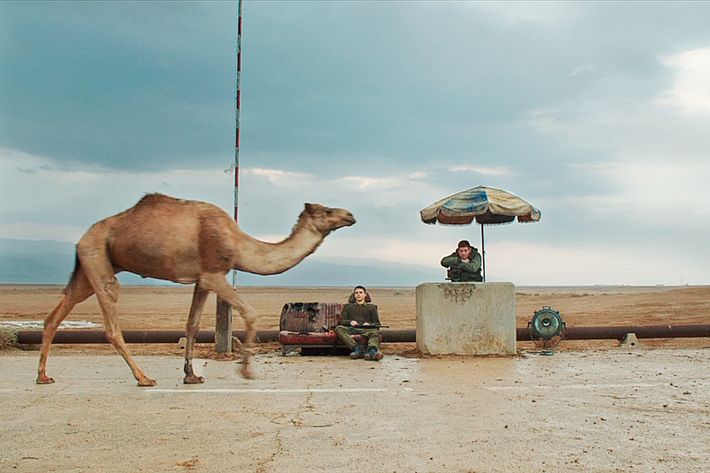Foxtrot: Movie Review

Samuel Maoz’s alternately acclaimed and reviled Israeli drama Foxtrot is thick with grief, confusion, and metaphor, the last of which extends to the title. Foxtrot is the name of an isolated desert checkpoint on a supply road trafficked by Palestinian cars and itinerant camels. But it’s also, of course, a dance, a box step Maoz uses to evoke life in a traumatized, blindly militaristic state where one “always winds up at the same starting point.” Under normal circumstances, I’d poke fun at all the movie’s egregious literary contrivances — the kind that make my Metaphor Horn go Ah-ooga! Ah-ooga! But a filmmaker able to speak wholly in metaphor is a rare kind of artist: a director-poet.
Maoz grips you from his opening scene, in which a woman, Dafna (Sarah Adler), opens the door of her apartment — note the painting behind her, a snarl of black lines — and, after a beat, begins to scream and weep, understanding that the soldiers she sees (we don’t see them, yet) bring news of the death of her son in the army. In the next room, her husband, Michael (Lior Ashkenazi), watches, stunned, as the soldiers efficiently sedate her, not bothering to ask his permission. The military has this down to a routine. To Michael they give a timer that goes off hourly to remind him to drink a glass of water — a non sequitur in a movie that frequently goes to the edge of black comedy without spilling over. It’s probably good that Michael hydrates himself, but the command is a reminder of his powerlessness — as is the dementia of the elderly mother he visits to break the bad news to. She fully registers her grandson’s death but doesn’t know exactly who Michael is.
Foxtrot is a triptych: three sections of equal length, the middle one in that remote desert checkpoint, where Michael’s son, Jonathan (Yonatan Shiray), lives side by side with three other soldiers. Coldly they inflict humiliations on the occasional Palestinian carload, stealing goods and, in a particularly disturbing scene, making their victims stand in a harsh spotlight in drenching rain. The rectangular corrugated shed in which they live is — Ah-ooga! Ah-ooga! — tilting and sinking, a way of suggesting the loss of their moral equilibrium. The movie has a wonderful animated sequence. Jonathan is a gifted illustrator, and his drawings come alive to tell a story his father passed down, of how a Bible bestowed by a dying Holocaust victim was swapped by a horny kid for an issue of Playboy with the cover model’s breasts masked by black X’s. In Jonathan’s continuation, the X’s transfer themselves to the eyes of the kid, who goes on to live a life of craven ignorance. The cartoon is a fun interlude, but it’s Jonathan’s bitterness toward his father that lingers like a bad smell.
Foxtrot feels unusually full for a film that seems to move in slow motion, in which the characters’ brains grind emptiness.
No scene unfolds in a straight line, and Ashkenazi carries so much inner tension that even in repose he seems in furious motion — cognitively foxtrotting, if you will. The soundtrack is haunting, although I could have done without yet another go-round with the adagietto from Mahler’s Fifth, exquisite as it is. But one interpolation is ingenious. It’s an old number called “Walk the Lonesome Night,” by the Continental, the spoken-word odyssey of a desolate lover underscored with eerie, organ-heavy lounge music.
No scene unfolds in a straight line, and Ashkenazi carries so much inner tension that even in repose he seems in furious motion — cognitively foxtrotting, if you will. The soundtrack is haunting, although I could have done without yet another go-round with the adagietto from Mahler’s Fifth, exquisite as it is. But one interpolation is ingenious. It’s an old number called “Walk the Lonesome Night,” by the Continental, the spoken-word odyssey of a desolate lover underscored with eerie, organ-heavy lounge music.
Foxtrot won the grand prize at last year’s Venice Film Festival and was shortlisted for the foreign-language Oscar. I suspect its lack of a nomination is a testament to how corrosive it is and, as such, should be viewed as a badge of honor. The Israeli government, meanwhile, is enraged by the film’s depiction of a war crime and its subsequent blatant cover-up, as well as the suggestion that this is business as usual. I agree that the sequence is improbable and encourage the government to view it as a metaphor — Ah-ooga! Ah-ooga! — for the mixture of dehumanization and arrogance that characterizes many of its policies. It would still be enraged but for reasons that cut deeper — and will endure.
Comments
Post a Comment